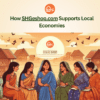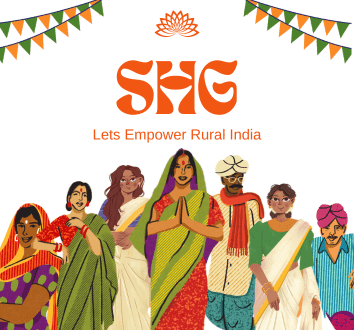Poverty remains a pressing global issue, affecting millions of individuals and communities around the world. In the fight against poverty, self-help groups (SHGs) have emerged as a powerful tool for empowerment, providing individuals with the resources, skills, and support needed to break free from the cycle of poverty. In this blog post, we will explore the role of SHGs in poverty alleviation and the transformative impact they have on individuals and communities.
- Building Financial Inclusion
One of the primary goals of SHGs is to promote financial inclusion among marginalized communities. By organizing themselves into groups, individuals pool their savings and create a common fund. This collective savings approach enables SHG members to access affordable credit, eliminating the need for predatory lenders or loan sharks. With increased access to credit, SHG members can invest in income-generating activities, start small businesses, or expand existing ventures, ultimately increasing their household income and reducing poverty.
- Encouraging Entrepreneurship
SHGs foster entrepreneurship by providing training, skill development, and mentorship to their members. Through capacity-building programs, SHG members acquire essential business skills, such as financial management, marketing, and product development. Armed with these skills and knowledge, members are empowered to launch their own enterprises, whether in agriculture, handicrafts, or services. By becoming entrepreneurs, SHG members not only create sustainable income sources for themselves but also contribute to local economic growth and job creation.
- Creating a Supportive Ecosystem
SHGs create a supportive ecosystem where individuals can collectively address common challenges. Regular meetings and discussions provide a platform for members to share experiences, exchange ideas, and provide mutual support. This peer-learning environment boosts confidence and encourages innovation. Moreover, SHGs often engage in social activities, such as awareness campaigns, health initiatives, and community development projects, further strengthening social bonds and addressing issues that perpetuate poverty.
- Empowering Women
Women constitute a significant proportion of SHG members, and their empowerment is a key outcome of SHG interventions. By joining SHGs, women gain access to financial resources, develop leadership skills, and challenge societal norms. SHGs provide a safe space for women to express themselves, voice their opinions, and actively participate in decision-making processes. This empowerment not only improves women’s economic status but also fosters gender equality and social progress within communities.
- Promoting Sustainable Development
SHGs often prioritize sustainable development practices, such as organic farming, environmental conservation, and eco-friendly production methods. These initiatives not only contribute to poverty alleviation but also address broader environmental and social challenges. By promoting sustainable practices, SHGs play a vital role in ensuring the long-term well-being of communities, preserving natural resources, and mitigating the adverse effects of climate change.
Conclusion
Self-help groups (SHGs) have emerged as a beacon of hope in the battle against poverty. Through financial inclusion, entrepreneurship promotion, and community support, SHGs empower individuals and communities to overcome poverty and build a better future. The collective efforts of SHG members not only uplift their own lives but also inspire and influence others to break free from the chains of poverty. As SHGs continue to expand their reach and impact, their contributions to poverty alleviation and sustainable development become increasingly significant. Together, let us celebrate and support the transformative power of SHGs in building a more equitable and prosperous society.

















Leave a reply